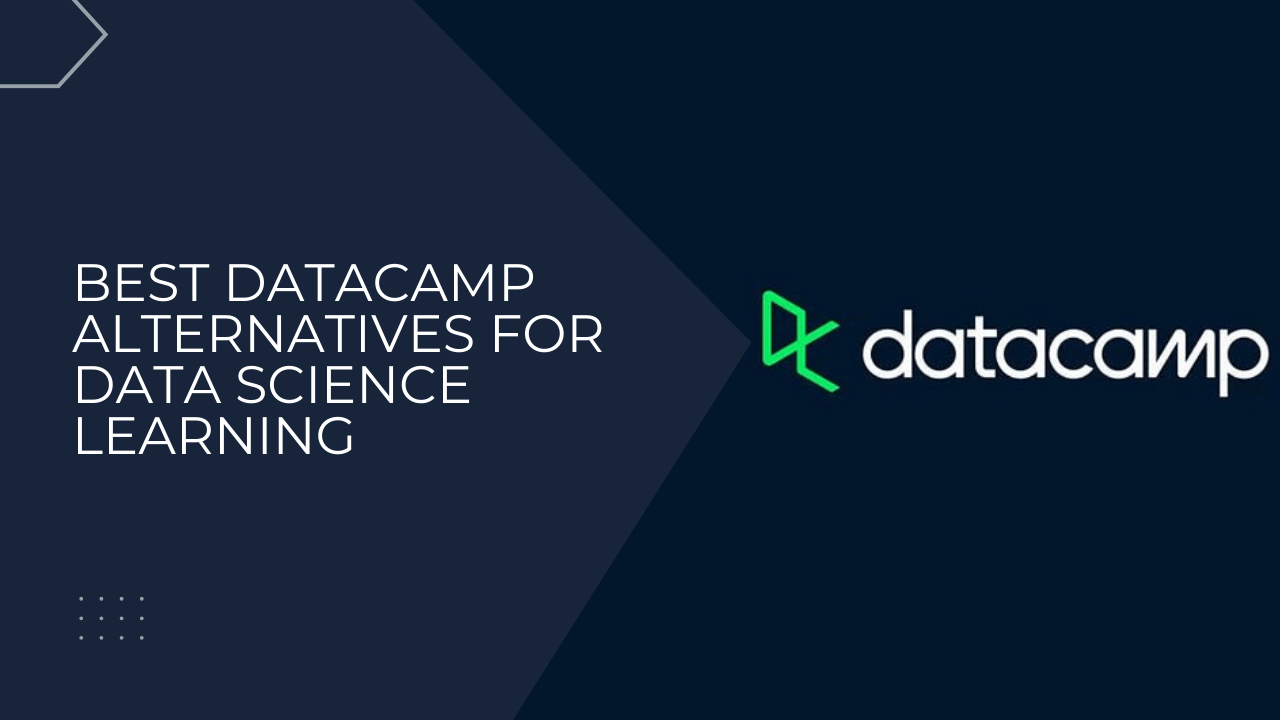If you’re exploring data science education, chances are you’ve stumbled across DataCamp. Known for its gamified learning style and interactive lessons in R and Python, it’s a favorite for many budding data scientists.
However, it’s not the only game in town. Whether you’re looking for more project-based learning, flexible schedules, or budget-friendly options, this article will help you discover nine of the best alternatives to DataCamp.
1. Coursera

Coursera stands out for offering high-quality, university-level courses and certifications, often in partnership with leading institutions and industry giants like Google and Amazon.
It offers a wide range of learning options, including individual courses and professional certificates like the “Google Data Analytics Professional Certificate” and the “IBM Data Science Professional Certificate.”
Pros:
- Offers a vast selection of courses, including specialized tracks and single-topic classes.
- Collaborates with top universities and companies, boosting credibility and value.
- Flexible study options, with access to financial aid and scholarships.
- Opportunity to earn respected certifications or even full degrees.
Cons:
- Some specializations come with a higher price tag.
- Theoretical focus may not suit learners looking for practical, hands-on training.
- Certain courses may lack projects or interactive components for skill application.
2. edX

edX is a trusted platform offering a broad range of online courses from prestigious universities and institutions worldwide.
With programs like “HarvardX: Data Science” and “MITx: The Analytics Edge,” it’s an excellent option for learners seeking quality content and academic recognition.
Pros:
- Extensive course offerings, including free options for budget-conscious learners.
- High-caliber content created by world-renowned institutions.
- Flexible, self-paced learning tailored to busy schedules.
- Opportunities to earn certificates and even university-level degrees.
Cons:
- Course quality can vary depending on the instructor and institution.
- Some programs require a baseline understanding of technical concepts.
- Limited interactivity in certain courses, which might not appeal to all learners.
3. Udacity

Udacity specializes in career-focused education through its project-based Nanodegree programs, designed to prepare students for in-demand tech roles.
Popular programs like the “Data Scientist Nanodegree” and “Machine Learning Engineer Nanodegree” offer hands-on experience and practical skills that can be applied directly to the workplace.
Pros:
- Courses emphasize real-world projects that build job-ready skills.
- A career-oriented curriculum is often developed with input from industry leaders.
- Includes options for mentorship and personalized career guidance.
Cons:
- Nanodegree programs can be pricey, making it a significant financial commitment.
- Requires consistent effort and a substantial time investment.
- May not align with all learning preferences or career objectives.
4. Kaggle Learn
Kaggle Learn is distinctive by blending concise courses with real-world datasets and competitions.
It’s a fantastic platform for hands-on learning in areas like machine learning, deep learning, and data visualization, allowing you to tackle real-world challenges and connect with a global community.
Pros:
- Emphasizes practical skills by working with real-world problems and datasets.
- Access to a vibrant, global network of data scientists for collaboration and learning.
- Free access to high-quality datasets and competitions to apply knowledge.
Cons:
- It may feel overwhelming for those just starting in data science.
- Heavy focus on competition might not appeal to everyone.
- Demands a strong sense of self-discipline and proactive engagement to maximize learning.
5. 365 Data Science
365 Data Science is a well-rounded platform designed to build a solid foundation in data science. It covers various topics, from basic statistics to advanced machine learning algorithms.
Unlike DataCamp's skill-specific tracks, 365 Data Science offers a more structured and in-depth curriculum, making it ideal for learners seeking comprehensive knowledge.
Pros:
- Clear and structured learning paths that guide students step by step.
- Broad coverage of essential data science topics, from fundamentals to advanced concepts.
- It is tailored for both beginners and those with intermediate experience.
Cons:
- It is not as widely recognized or prestigious as some other platforms.
- Lacks the interactive learning experience provided by some competitors.
6. LinkedIn Learning

LinkedIn Learning blends professional development with education, seamlessly connecting its courses to LinkedIn to help boost your career opportunities.
Its curriculum is tailored to match current job market demands, offering practical skills and insights for aspiring data science professionals.
Pros:
- Links directly with LinkedIn, helping learners showcase skills and expand their professional network.
- It focuses on teaching in-demand skills that are aligned with industry needs.
- Offers a variety of courses taught by experienced professionals.
Cons:
- It may lack depth in advanced data science topics compared to other platforms.
- More suited for career-focused learners than those pursuing academic or research goals.
7. Pluralsight

Pluralsight is a go-to platform for building technology skills, offering high-quality video courses designed for tech professionals.
It’s a top choice for practical, tech-focused learning, offering excellent courses in programming (Python, R), data engineering, and cloud computing.
Pluralsight stands out with its targeted content on programming languages, cloud-based data solutions, and essential tools for today’s data science roles.
Pros:
- Engaging video content paired with interactive exercises for hands-on learning.
- Skill assessments and personalized learning paths to guide progress.
- Strong focus on in-demand technologies relevant to data science careers.
Cons:
- Pricing can be higher than some alternatives, especially for full access.
- Limited emphasis on the theoretical or statistical aspects of data science.
8. Dataquest
Dataquest emphasizes learning by doing, offering a project-based approach that uses real-world datasets. It focuses heavily on teaching Python, R, and SQL, helping learners develop practical skills through hands-on projects.
Pros:
- Engages learners with project-based tasks using real-world datasets.
- Prioritizes practical, hands-on experience over theoretical lessons.
- Offers a supportive community and an interactive learning environment.
Cons:
- Course selection is more limited compared to some other platforms.
- Less appealing to those who prefer structured, theory-focused learning paths.
9. Codecademy

Codecademy is known for its interactive, beginner-friendly approach to learning coding. It’s an excellent choice for those starting their journey in data science, offering foundational programming courses in Python, R, and SQL that are essential for building core skills.
Codecademy helps learners master the basics of programming and data manipulation, setting a solid groundwork for further exploration into data science.
Pros:
- Offers an interactive platform with hands-on coding exercises for immediate practice.
- Beginner-friendly and easy-to-use interface, perfect for newcomers.
- Emphasizes practical skills through real-world projects.
Cons:
- Limited in-depth coverage of advanced data science topics.
- Primarily focuses on coding, with less emphasis on statistical or machine learning concepts.
Quick Comparison
Choosing the right platform depends on your learning goals and preferences. Here’s a snapshot of what each platform offers and who they’re best suited for:
- Coursera: Ideal for academic learners seeking certifications with a broad range of courses from top universities.
- edX: Great for flexible, university-level courses with diverse topics and free learning options.
- Udacity: Perfect for career-oriented learners focused on hands-on, project-based Nanodegree programs.
- Kaggle Learn: Best for those building practical skills through real-world datasets and competitions.
- 365 Data Science: A strong choice for structured, comprehensive learning in data science fundamentals.
- LinkedIn Learning: Tailored for professionals aiming to enhance job-relevant skills and boost career growth.
- Pluralsight: Suited for tech enthusiasts focusing on programming, data engineering, and skill assessments.
How to Choose the Best DataCamp Alternative
Choosing the right platform starts with knowing your goals. Whether you’re gearing up for a career change, building on existing skills, or diving into academic growth, the best option will depend on your unique needs.
- Define Your Goals: Clarify whether you want to switch careers, deepen your expertise, or gain foundational knowledge.
- Consider Your Budget: Platforms range from free options to premium subscriptions—choose one that aligns with your financial plan.
- Identify Your Learning Style: Decide if you prefer self-paced flexibility, structured lessons, or hands-on, project-based learning.
- Match Platform Strengths to Your Needs: Focus on what matters most to you, whether it’s machine learning, data visualization, or programming.
- Try Before You Commit: Take advantage of free trials or sample content to see if the platform meets your expectations before investing.
Conclusion
DataCamp is an excellent option for learning data science but is far from the only choice. Platforms like Coursera, edX, and Udacity offer robust alternatives, each catering to different learning styles and career goals.
Whether you’re looking to save money, dive into projects, or earn a prestigious certification, there’s a platform out there for you. Explore these options, find what works best for your needs, and take the next step in your data science journey.


